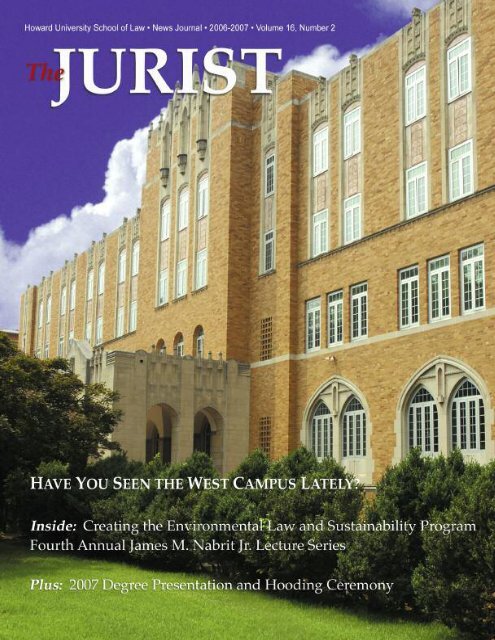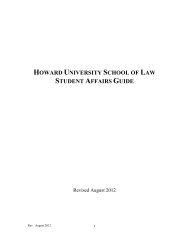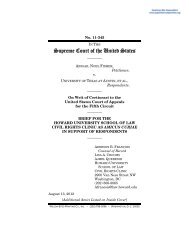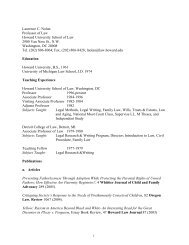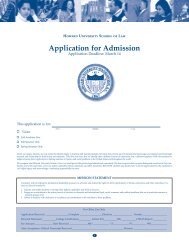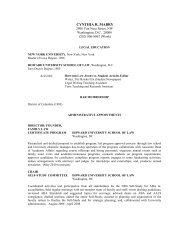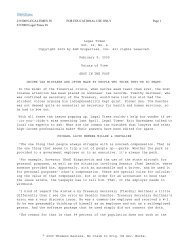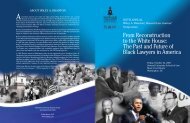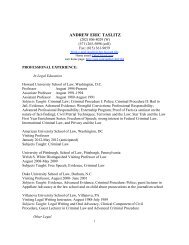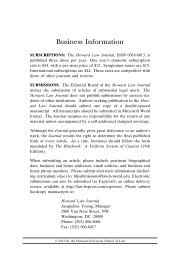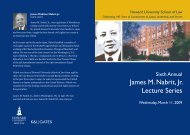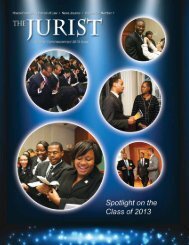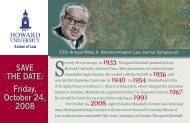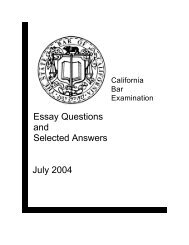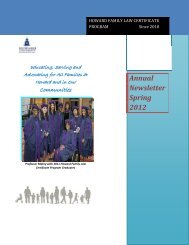Jurist Summer 2007.qxd - Howard University School of Law
Jurist Summer 2007.qxd - Howard University School of Law
Jurist Summer 2007.qxd - Howard University School of Law
- No tags were found...
You also want an ePaper? Increase the reach of your titles
YUMPU automatically turns print PDFs into web optimized ePapers that Google loves.
OLIVER W. HILL DIESNEWS & INFORMATIONOn August 5, 2007, Oliver W. Hill died in Richmond, Virginia. Hewas 100 years old. According to his family, he died peacefully at hishome. “The <strong>Howard</strong> <strong>University</strong> <strong>School</strong> <strong>of</strong> <strong>Law</strong> family extends itsympathy to the family <strong>of</strong> Oliver W. Hill. He was among the greatest<strong>of</strong> a great generation <strong>of</strong> social engineers,” said <strong>Law</strong> <strong>School</strong> DeanKurt L. Schmoke. “Ours is a better country because <strong>of</strong> his tirelessadvocacy.” Mr. Hill was a 1933 graduate <strong>of</strong> the law school. In April2007, the law school held a celebration in honor <strong>of</strong> his 100th birthday.(See photo on page 11). A memorial service for Mr. Hill washeld at the law school on September 7, 2007.PROFESSOR HENRY JONES RETIRESPr<strong>of</strong>essor Jones at the 2004 BrownConference on Race and Rights.The <strong>Howard</strong> <strong>University</strong> <strong>School</strong> <strong>of</strong> <strong>Law</strong> communityacknowledged with great pride the tremendous contributions<strong>of</strong> Pr<strong>of</strong>essor Henry H. Jones, who retired after 39 years<strong>of</strong> service. Pr<strong>of</strong>essor Jones, a 1956 graduate <strong>of</strong> the law school,began teaching at the law school in 1968. He taught manycourses, including Civil Procedure, Remedies, and Race <strong>Law</strong>.He also made other contributions to the law school and<strong>University</strong>, serving on numerous committees over the years.In May 2007, the law school held a reception to honorPr<strong>of</strong>essor Jones’ tenure and retirement. In August, theNational Bar Association presented him with the 2007Outstanding Alumni Award.1869-2009: 140 YEARS OF HOWARD LAWIn preparation for celebrating our 140th anniversary in 2009, thelaw school is putting together a pictorial history <strong>of</strong> the <strong>Howard</strong><strong>University</strong> <strong>School</strong> <strong>of</strong> <strong>Law</strong>, to cover the period 1869 to 2009. Weneed your pictures and old photographs. Alumni, students, andothers interested in contributing pictures to this important projectshould contact <strong>Law</strong> <strong>School</strong> Archivist Seth Kronemer at (202) 806-8304 or via email at skronemer@law.howard.edu.2 THE JURIST
ADOPTION AWARENESS DAY AT HOWARD<strong>Law</strong> <strong>School</strong> Faculty Member Cynthia Mabry‘83, displays a copy <strong>of</strong> Adoption <strong>Law</strong>: Theory,Policy and Practice, her new textbook on adoptionlaw. In January, the law school organizedAdoption Awareness Day to bring attention tothe legal issues and concerns related to adoptionand foster parenting. Representativesfrom adoption agencies in Washington, DC,Fairfax County, Virginia, and Prince GeorgesCounty, Maryland distributed informationand answered questions. Attendees alsowatched a video which featured childrenavailable for adoption through the Wednesday’s Child program. Pictured with Mabry are (lto r) Judges Ronna Beck, Kaye Christian, Jeanette Clark, and Arthur L. Burnett Sr., all judgeson the Superior Court <strong>of</strong> the District <strong>of</strong> Columbia. The law school hosted a reception afterwards.The <strong>Howard</strong> <strong>Law</strong> Journal will collaboratewith the law firm <strong>of</strong> Vinson andElkins to publish an annual symposiumissue <strong>of</strong> the <strong>Howard</strong> <strong>Law</strong> Journal.The first issue is scheduled for fall2007. Vinson & Elkins presented TheJournal with a check for $18,000, tosupport publication. Pictured are( l to r) Mark Laufman and NebiatBaarez ’03 from Vinson & Elkins,Dean Schmoke and Faculty AdvisorAndrew Gavil.THE JURIST 3
BARRY SCHECKC. CLYDE FERGUSON LECTURER“I do believe that within our lifetimes, inthe next 10, 15, or 20 years, we will end capitalpunishment in the United States,” saidBarry Scheck, co-director <strong>of</strong> the InnocenceProject. Scheck spoke at the law school lastfall about the state <strong>of</strong> capital punishmentand about the work <strong>of</strong> the InnocenceProject. His speech “Innocence, Race, andthe Death Penalty,” can be found in itsentirety in the <strong>Howard</strong> <strong>Law</strong> Journal, Volume50, Issue 2, and on the law school Web site.CHOKWE LUMUMBA CHARLES HAMILTON HOUSTON LECTURERChokwe Lumumba delivered the annualCharles Hamilton Houston lecture inFebruary. Lumumba, chair <strong>of</strong> the NewAfrikan People's Organization (N.A.P.O.),is also the co-founder <strong>of</strong> the MississippiDisaster Relief Coalition (MS-DRC). Theorganization assisted in the distribution <strong>of</strong>tons <strong>of</strong> material and aid to HurricaneKatrina survivors. Lumumba organizedthe December 2005 From Outrage to ActionConference in Jackson, Mississippi, whichwas attended by nearly 600 HurricaneKatrina survivors and supporters.Lumumba’s lecture was fittingly titled“21st Century New Afrikan (Black)<strong>Law</strong>yers: Serving Our People in theTradition <strong>of</strong> Charles Hamilton Houston.”Dean Schmoke and SBA President RizwanQureshi presented 3L Student Kara Beverlywith an academic achievement award for herwork with the SBA and the Charles HamiltonHouston Moot Court Team.THE JURIST 5
By Jo Ann Haynes Fax<strong>Howard</strong> <strong>University</strong> <strong>School</strong> <strong>of</strong> <strong>Law</strong> hasundergone some major renovations sincethe new library opened in 2001. The university,alumni, and students have all givenfunds toward the capital improvement projects,and the school has benefited from those changes.Because many <strong>of</strong> you have not returned to youralma mater in recent years, we thought it wouldbe nice to share with you an illustrative view <strong>of</strong>the numerous physical facility enhancements toour West Campus.Come InsideThe summer <strong>of</strong> 2004 brought a major projectto the West Campus: construction <strong>of</strong> a plaza infront <strong>of</strong> Houston Hall. Previously a parking lot, thisexpanded area now adds visual appeal to what isnow the main entrance. The circular stone plazabrings a peaceful yet elegant view to all whoenter the <strong>Howard</strong> <strong>University</strong> <strong>School</strong> <strong>of</strong> <strong>Law</strong>. Thestone benches were a gift from the Class <strong>of</strong> 2004 .The entrance doors to the bridge on the firstfloor connecting Holy Cross and Houston Hallwere also replaced in 2004. The new doors preservedthe architectural integrity <strong>of</strong> the buildingsand bring more visual appeal to the first floor <strong>of</strong>Houston Hall, which houses the chapel and thedean’s <strong>of</strong>fice. The exterior doors in the HolyCross Foyer were also beautifully restored. Theold wrought iron finish and tarnished brassdoors were replaced with wooden doors withvertical glass panes, which add to the ambiance<strong>of</strong> the Holy Cross foyer and also provide a beautifulview <strong>of</strong> the exterior grounds facing Upton6 THE JURIST
Photos by James K. PleasantHouston Hall door leading tothe Holy Cross Foyer.Upton Street exit doors.Entrance to Houston Hallfrom the Holy Cross Foyer.Street. This project was partially funded by alumnidonations to the annual fund account.The fall <strong>of</strong> 2003 signaled the start <strong>of</strong> enhancementsto the law school and particularly in thestudent lounge or, as it is known, the “Rhatt.”New furnishings, carpet, tile, and accessoriesmade the student lounge very contemporary anduser friendly to meet the needs <strong>of</strong> a new generation<strong>of</strong> students. Because this area is highly used,new computers were installed in 2004 and 2005.Students can now access the Internet and checktheir email. The major renovations and improvementswere funded by the university, and alumnidollars and gifts paid for the computers.For the safety and security <strong>of</strong> our students,faculty, staff members, and visitors, a new 42-camera, digital-taping security system wasinstalled in the fall <strong>of</strong> 2004. The system monitorsthe hallways, <strong>of</strong>fices, and entrances to the buildings.This system has enhanced the CampusPolice’s ability to canvas the surroundings and toobserve potential problems. We also made majorimprovements to secure the outside <strong>of</strong> our facilitiesby adding speed bumps, stop signs, andpedestrian crossing lines in the driveway andparking areas. These safety precautions havemade drivers more observant <strong>of</strong> the pedestriansin the parking lot. The upgrades were fundedthrough law school funds, and through giftsfrom alumni and friends.Within the past five years, all three elevatorsat the law school have had major overhauls: inHouston Hall, in Holy Cross Hall, and in thespring <strong>of</strong> 2007, in Notre Dame Hall. Those elevatorshad deteriorated and were in great need <strong>of</strong>replacement. This project has brought immenserelief to all parties at West Campus. In particular,the Notre Dame elevator restoration will be <strong>of</strong>great value to the recruiting firms and associationsthat come to the law school and to the studentorganizations and staff <strong>of</strong>fices housed inthat building.The old cafeteria was transformed into thenew dining hall. This major renovation saw thebadly lit industrial space <strong>of</strong> the old cafeteriatransformed into a bright, spacious, and cheerydining area with modern furniture, art, and lighting.The dining hall is also wired for computeruse, and you can regularly see faculty membersand students dining together. The dining hallcan seat approximately 130 people and it nowTHE JURIST 7
hosts lunches and receptions for many law school events. Like the plazarenovation, the dining hall renovation was funded by the university.Technology Advances ThroughoutTechnological advances have assisted with information disseminationthroughout the law school and with teaching and learning in theclassrooms. In 2004, two <strong>of</strong> the larger classrooms were hard-wired forlaptops, making all four large classrooms in Houston Hall available forcomputer use by the students. Classrooms 2 and 3 are currently beingupgraded to increase the smart technology in those rooms. Screens havebeen added to every classroom on the campus to facilitate the use <strong>of</strong>portable technology. Having this technology available and accessible toall faculty members continues to be challenging, given that the lawschool has no dedicated personnel for audiovisual assistance; we relypurely on library staff members and students to provide support.Through funding by an anonymous private donor, a grant fromHousing and Urban Development (HUD), and through alumni giving,smart technology and electronic communications have improved onWest Campus. Classroom 4 is now a state-<strong>of</strong>-the-art classroom, with thecapabilities for videotaping, smart technology, and distance education.The library classroom, Room LL101, has also been equipped for distanceeducation through this initiative.The contribution by the donor enabled us to add a major enhancementto our electronic communications: plasma screens for announcements,programs, and other special news and events throughout the lawschool. The installation <strong>of</strong> those 12 screens last December added a newdimension to our ability to keep everyone on campus fully informed.The feedback has been extremely positive about this new addition.Through funding from the HUD Fair Housing grant, we upgradedthe Clinical <strong>Law</strong> Center’s computer lab and conference room. A newserver and computers were added to the clinic lab for the clinic students’use, and new furniture was added to the conference room. The Clinical<strong>Law</strong> Center is planning to add more technological equipment to the conferenceroom and <strong>of</strong>fices.Some smaller facility projects have been undertaken within the pastfew years. The busts <strong>of</strong> Thurgood Marshall and Charles HamiltonHouston received some minor restoration through the help <strong>of</strong> the FineArts Department. Fine Arts and the Health Science Library donated newpedestals for each bust.The Houston Hall foyer in front <strong>of</strong> the new elevator was redecoratedas well, as you can see from the photo. To further improve Houston Hall,the university funded the renovations to the male and female restrooms8 THE JURIST
Happy Birthday Mr. Hill!Oliver W. Hill, Class <strong>of</strong> 1933, turned 100 years old on May 1, 2007. On April 5, 2007 the entire lawschool community celebrated Hill’s birthday.Rebuilding New Orleans OneSpring Break At a TimeDean Schmoke received the proclamationsfrom the students during a law schoolassembly recognizing the students and facultywho participated in the AlternativeSpring Break. “Your work was in the finestsocial engineering tradition <strong>of</strong> this lawschool. The positive impact <strong>of</strong> your activitieswill be felt by individuals known andnot known to you for many years," saidDean Schmoke.Nearly 60 <strong>Howard</strong> law students and faculty membersvolunteered to spend their spring break in New Orleans,Louisiana, providing legal and humanitarian services tothose still desperately in need. Students worked in theNew Orleans District Attorney’s Office to help homeownersclear their titles; they represented property ownersin eminent domain cases; they worked with criminaldefendants in the Public Defenders Office; andthey also worked with Habitat forHumanity to rebuild homes.On March 15, 2007, the CityCouncil <strong>of</strong> New Orleans presentedthe students with twoproclamations in recognition <strong>of</strong>their dedication and commitment.This was the second yearin a row that <strong>Howard</strong> law studentsspent their spring breakrebuilding New Orleans.THE JURIST 11
Great strides have been made in improvingenvironmental conditions across the UnitedStates, thanks in large part to the environmentallaws <strong>of</strong> the 1970s and 1980s. However, agrowing body <strong>of</strong> evidence shows that people <strong>of</strong>color and low-income residents shoulder a disproportionateshare <strong>of</strong> our nation's environmentalburden.Addressing this environmental disparity andbuilding the capacity <strong>of</strong> communities to improvetheir environmental health and vitality is the goal<strong>of</strong> environmental justice. Environmental justicestands for the proposition that all people have abasic right to clean air, clean land, and cleanwater, and that all people should have a meaningfulsay in how environmental decisions aremade.It’s an issue that’s catching on in communities,in the courts and state legislatures, in the federalgovernment, and in business and industry.Roughly 39 states have environmentaljustice laws, policies,or programs, accordingto a recent American BarAssociation report.THREE COMMITTEDATTORNEYSQuentin Pair, Nicholas Targ,and Benjamin Wilson are theadjunct law pr<strong>of</strong>essors whohelped establish <strong>Howard</strong>'s Nicholas TargEnvironmental <strong>Law</strong> andSustainability Program in partnership with theAmerican Bar Association and the District <strong>of</strong>Columbia Bar Association. They argue that environmentallaw and diversity in the bar are key toachieving environmental justice. They are alsoquick to add that environmental law makes for agreat career.12 THE JURIST
The three attorneys, who have been joinedin the program by lawyers Leslie Fields <strong>of</strong> theNatural Resources Defense Council and SteveWolfson <strong>of</strong> the Environmental ProtectionAgency (EPA), have a commitment to achieveenvironmental justice and to seeing that theenvironmental bar achieves greater diversity.Although they sometimes represent differentand potentially adverseparties, the adjunct pr<strong>of</strong>essorsare friends andshare a commitment tothe environmental bar,to social justice, andto <strong>Howard</strong> <strong>University</strong><strong>School</strong> <strong>of</strong> <strong>Law</strong>.“The environmental bardoesn’t look like America,and that’s a problemfor communities, government,and corporateBenjamin Wilsonclients,” says Targ, who is also senior counselwith Holland & Knight. “It’s a problem thatwe can do something about, and <strong>Howard</strong> hasa special role to play.”Wilson, a senior partner and environmentallitigator with Beveridge & Diamond, concurs:“Diversity and cultural understandingcan be essential to understanding and winningyour case, and to making sure that allvoices are heard. It's that fundamental,” hesaid.A FISHY TALERelating an example that blends the need fordiversity and the achievement <strong>of</strong> environmentaljustice, Pair, a trial attorney with theDepartment <strong>of</strong> Justice's EnvironmentalEnforcement Section, describes a case that wasbrought by his colleagues. The case involvedthe release <strong>of</strong> hazardous waste into a bay estuary.Thus, it was essential for liability anddamages purposes to identify whether peoplewere fishing for and eating a particular type <strong>of</strong>fish that had been contaminated by environmentalpollution.Most <strong>of</strong> the people who catch and eat thattype <strong>of</strong> fish are low-income immigrants fromMexico and other developingcountries. Andmany <strong>of</strong> them may be inthe United States withoutrequired documentation,making themlegally and politicallyvulnerable.The attorneys representingthe environmentaldefendant, however,failed to recognize the Quentin Pairsensitivities involvedwith developing the facts <strong>of</strong> the case. Theiractions included sending out a boat with menholding binoculars to investigate whether thelocal fishermen were catching the contaminatedspecies <strong>of</strong> fish.“Perhaps understandably,” says Pair, “theMexican anglers did not cooperate with theboatload <strong>of</strong> consultants and attorneys. Indeed,as soon as the consultants and attorneys goton the water and started investigating, theanglers immediately stopped what they weredoing, packed their bags, and left.”“Because they were unable to secure accuratedata, opposing counsel missed one <strong>of</strong> thecritical issues <strong>of</strong> the case—the fishermen were,in fact, catching, selling, and eating the contaminatedfish.”Pair added: “The Department <strong>of</strong> Justiceattorneys did their homework, had the appropriatecultural diversity on the team, andworked with a nonpr<strong>of</strong>it organization thathad the trust <strong>of</strong> the community. Informationthat the government secured was accurate andsupportable. It helped to win the case. Andmost important, it helped the communitymaintain its health. That’s what I call goodlawyering, and that's environmental justice."PREPARATION IN THE CLASSROOMDiversity in the bar starts with preparation inthe classroom. But only three <strong>of</strong> the eight historicallyblack colleges and universities withlaw schools teach environmental law. “If lawstudents do not have exposure to land use andenvironmental law in school, they are less like-THE JURIST 13
ly to practice environmental law when theygraduate,” explains Wilson. Recognition <strong>of</strong>this need was the genesis <strong>of</strong> the program.Before joining Holland & Knight, Targserved in leadership positions with the EPA.The EPA has a highly competitive clerkshipprogram that attracts talented students fromacross the country. One summer, Targ noticedthat his clerk, a student from <strong>Howard</strong> <strong>Law</strong><strong>School</strong>, was not performing at her potential.“She was highly intelligent, a good writer, andefficient, and she had a strong work ethic.However, she simply did not have the background<strong>of</strong> the other clerks in the programbecause <strong>Howard</strong> had not <strong>of</strong>fered environmentallaw for two years,” explained Targ. “We gother involved in a white-collar environmentalcrimes matter, an area where she had experience,and she excelled. She was graduatedmagna cum laude a few years back, and hercareer is taking <strong>of</strong>f.”To address the issue, Wilson, Pair, and Targ,along with Targ's clerk, met with Dean KurtSchmoke to discuss the establishment <strong>of</strong> anenvironmental law program at <strong>Howard</strong>. Thedean, the former mayor <strong>of</strong> Baltimore, immediatelyembraced the idea. He announced theprogram’s formation at an awards ceremonywith District <strong>of</strong> Columbia Bar President JohnCruden. (Cruden serves as the Department <strong>of</strong>Justice’s top career environmental lawyer).Sponsored by the American Bar Associationand the D.C. Bar Association, the programtitled “Partners for Diversity and Leadership,”is now in its third year. It is run on a pro bonobasis and is achieving results:• More than 150 <strong>Howard</strong> law students havetaken environmental law courses taught ona pro bono basis.• Fifteen students have clerked for firms,agencies, and nongovernmental organizationsaddressing environmental law issues.• Twenty-five students wrote papers <strong>of</strong>publishable quality on international environmentallaw topics.• Twenty students have written their thirdyear papers on environmental law issues.Building on this success, the law schoolhosted the largest nongovernmental environmentaljustice conference in more than adecade on March 29–31, 2007. Sponsored bythe Department <strong>of</strong> Energy, the American BarAssociation, and many others, the event(l to r) Nicholas Targ, Benjamin Wilson, Okianer Christian Dark, John Cruden, Emily Hetch, Charles R. Lowery Jr.,and Quentin Pair at the law school last year.14 THE JURIST
Achievements <strong>of</strong> the Environmental <strong>Law</strong> and Sustainability Program• <strong>Howard</strong> fielded an environmental moot court team for the first time and won a bestoralist prize at the Pace National Environmental <strong>Law</strong> Moot Court Competition.• Students have won prestigious environmental fellowships with the American BarAssociation and United Nations.• Distinguished environmental law scholars and ranking governmental <strong>of</strong>ficials havespoken at <strong>Howard</strong>.• Participated in the 2005 Anacostia River Clean-up with the EPA, ABA, and the EarthConservation Corps.brought together nearly 500 people from communities,academia, industry, and governmentto discuss strategies and to formulatesolutions. Responding to the success <strong>of</strong> thefirst conference, the sponsors anticipate makingit an annual event.Although the program is starting to have anational reach, the law school’s Environmental<strong>Law</strong> and Sustainability Program is fundamentallyabout the student body—creating acurriculum for success and fostering leadership,according to the pr<strong>of</strong>essors.“This coming year, it is our intention thatone <strong>of</strong> our pr<strong>of</strong>essors will teach the environmentallaw survey course,” said AssociateDean Okianer Christian Dark. “We will continueto <strong>of</strong>fer a course on sustainable developmenttaught by Pr<strong>of</strong>essor Harold McDougall.Pr<strong>of</strong>essor McDougall’s course adds new energyto our environmental law course <strong>of</strong>ferings.”Associate Dean Dark noted. Dean Schmokeshares this enthusiasm and sees a bright futurefor the program as well. He also sees the programas one that keeps with <strong>Howard</strong>’s tradition<strong>of</strong> excellence, social justice, and legacy. Herecently wrote:In fulfilling <strong>Howard</strong> <strong>University</strong>’s congressional mandate to educate its students to developtheir highest capabilities and skills; engage asan institution in the active pursuit <strong>of</strong> solutionsto domestic and international legal, social, economicproblems that are <strong>of</strong> particular concernto minority groups; and imbue its studentswith dedication to excellence and commitment to the solutions to those problems, theEnvironmental <strong>Law</strong> Partnership is Exhibit A.Dean Schmoke added:We would like to add a full-time environmentallaw pr<strong>of</strong>essor to our faculty, create a nationalenvironmental law and sustainability institute,and expand our clinical program to includeland use, environmental justice, and sustainabilityissues. We are exploring funding opportunities.And, I expect that our alumni andfriends may hear more about that in the comingmonths.<strong>Howard</strong> <strong>University</strong> <strong>School</strong> <strong>of</strong> <strong>Law</strong> holds aunique place among American law schools. Itscommitment and contribution to civil rights,voting rights, and constitutional law arebeyond question. Now add environmentallaw and environmental justice to this legacy.To learn more about the program or toemail the pr<strong>of</strong>essors, go to the <strong>Law</strong> <strong>School</strong>’sWeb site and click on “Environmental <strong>Law</strong>and Sustainability.”________________________________________The <strong>Jurist</strong> thanks Nicholas Targ for his contributionsto this article.THE JURIST 15
Surviving <strong>Law</strong> <strong>School</strong>:Models for SuccessBy Norwood HollandClass <strong>of</strong> 1978For most lawyers, law schoolconjures up memories <strong>of</strong> allnighters,study group guffaws,and eccentric pr<strong>of</strong>essorsinvoking fear with theirSocratic method. Facing an uncertainfuture, today’s law studentmay not realize that law school is atime to relish. In years to come, theexperience will fade to fond recollections.Sharing this outlook, acouple <strong>of</strong> my classmates took time from theirbusy schedules to discuss with me their careerpaths after their <strong>Howard</strong> law experience. GregoryMeeks represents New York’s 6th CongressionalDistrict, and Leslie Rogers serves asregional administrator <strong>of</strong> the Federal TransitAdministration’s Region IX in San Francisco.Members <strong>of</strong> the Class <strong>of</strong> 1978, both Meeks andRogers distinguish themselves in public service.GREGORY W. MEEKSRepresentative Gregory Meeks (D-N.Y.)assumed his Congressional <strong>of</strong>fice on February 3,1998. He started out as an assistant district attorneyin Queens and from there moved to theOffice <strong>of</strong> Special Narcotics Prosecutor. He servedas counsel to the State Investigation Commission,which investigates <strong>of</strong>ficialmisconduct and organized crime.He became a judge and laterbecame the supervising judge <strong>of</strong>the Workers’ Compensation System<strong>of</strong> New York. Then he movedinto elected politics. Whatprompted him to run for Congress?“Just prior to going to Congress,I did five years as a member<strong>of</strong> the New York State Assembly,and it was an extension <strong>of</strong> mydoing what I did in the assembly,"Meeks explained. When he cameout <strong>of</strong> law school, he said, it was nothis goal to go into elected politics. “Iwanted to be a good lawyer and beinvolved in politics, but I alwaysthought it would be behind thescenes. So I supported candidates. Ipracticed election law to help people.I started a political club andsupported community groups as alawyer. One thing led to another, and when theRev. Floyd Flake retired from Congress, it justseemed to me to be a natural extension to moveon to Congress. I could continue the same publicservice, if you will, and thereby affect morethings, more policies, but on a higher level.”Being a Big PlayerMeeks serves on the International RelationsCommittee and has a real interest in the development<strong>of</strong> small economies. He calls it goodbusiness and aspires to use trade and internationalrelations as tools <strong>of</strong> both diplomacy anddevelopment.“I intend to be a big player on foreign policyissues,” he said. “It is a big concern for me–thevery idea <strong>of</strong> the main committee setting up andasking questions, the ability tobring witnesses in, and the possibility<strong>of</strong> subchairing a committee.”Meeks believes that his ideas willhave a much greater influence withhis party being in the majority andworking in conjunction with members<strong>of</strong> the Senate to bring bills tothe president.Meeks’s road to Congress wasnever mapped out. Moving from apolitically active local prosecutorto an elected <strong>of</strong>ficial <strong>of</strong> national16 THE JURIST
“I intend to be a big player on foreign policy issues.”Representative Gregory Meeksprominence may be a common route, but fewlaw school students will follow this vocationalpath. Most will prefer to labor in the vineyards—private, solo, or corporate practice, or even governmentservice. Some may opt-out <strong>of</strong> a legalcareer all together.LESLIE ROGERSLeslie Rogers grew up in Montgomery, Alabama,and vividly remembers that he was just beginninghis formal education during the Montgomerybus boycott. His first forayinto transportation began betweenhis second and third year <strong>of</strong> lawschool. He was working as a summerintern with the U.S. Railway Association.After law school, he joined theUrban Mass Transportation Administration.He started out in the chiefcounsel’s <strong>of</strong>fice in Washington, D.C.,and became the regional counsel inDenver for a very short period. Henext moved to New York where heserved for 11 years as the regionalcounsel. In 1993, changing to the managementside, he was selected as the deputy regionaladministrator <strong>of</strong> San Francisco; in 1996, hebecame the regional administrator.Rogers has received numerous awards andcommendations. In 2000, he was selected to jointhe Senior Executive Service (SES). Members <strong>of</strong>the SES serve in the key positions just below thetop presidential appointees. SES leaders possesswell-honed executive skills and share a broadperspective <strong>of</strong> government and a public servicecommitment that is grounded in the Constitution.Some <strong>of</strong> Rogers’s recent achievementsinclude co-leading a trade mission to countriesin South and Central America, namely Colombia,Ecuador and El Salvador. He spoke <strong>of</strong> beingparticularly satisfied with having spent time inMississippi, where he engaged in efforts torespond to the devastation caused by HurricaneKatrina.Safe and efficient transportation systems areessential to the economic vitality <strong>of</strong> the UnitedStates and to the nation’s ability to compete in aglobal economy. Most important, such systemsimprove the quality <strong>of</strong> life <strong>of</strong> all Americans.Local and state governments subsidize the operations<strong>of</strong> most public transit services. Those governmentsprovide matching funds to receive acapital grant <strong>of</strong> up to 80 percent from the FederalTransit Administration (FTA), an agency <strong>of</strong> theU.S. Department <strong>of</strong> Transportation. The FTAadministers programs that provide funding andsupport services to state and local agencies that,in turn, operate a wide range <strong>of</strong> public transportationservices.Charged with carrying out thismission, Rogers explained some <strong>of</strong>the challenges <strong>of</strong> a regional administrator:“When I deal with communitytransit agencies, a persistent problemis having them prioritize projects.Obviously, there are needs in everycommunity and proposed solutionsor responses to address those problems,but there is a finite degree <strong>of</strong>funding. Communities will try tohave three or four competing priorities, and wehave found over time that competition can beproblematic. That’s an external problem,” hesaid.Articulating a Vision“It is a challenge to any leader to continue toarticulate a vision, to remain positive, and toremain focused on the daily challenges,” Rogerssaid. “On any given day, and particularly in aregion like mine, there are crises in many differentcommunities. The challenge is to stayfocused and to devote the proper attention totrying to address all the competing interests.”Rogers has devoted a 30-year career to transportationissues. When asked what, if any, reflectionshe had on those 30 years, he responded:“I think it’s been time well spent, and I’ve hada great experience. My service has afforded mean opportunity to live in four major cities, Washington,D.C., Denver, New York, and now SanFrancisco. But I’ve also had the opportunity torespond to the needs <strong>of</strong> moderate and smallTHE JURIST 17
“The breadth <strong>of</strong> my experience has been fairly far reaching, andI’d like to believe that I am making a difference.”Leslie Rogerscommunities and rural areas—even tribalgovernments. The breadth <strong>of</strong> my experience hasbeen fairly far reaching, and I’d like to believethat I am making a difference. Transportation isone <strong>of</strong> few industries where we actually buildthings and so at the end <strong>of</strong> the day, you can actuallysee the product <strong>of</strong> your handiwork. Butmore important, it’s the notion that you areengaged in activities and initiatives that areshaping the communities <strong>of</strong> the future and thatwill have a lasting value for generations tocome," he said.Networking and the <strong>Howard</strong> ExperienceDuring his <strong>Howard</strong> days, Rogers took on numerousextracurricular activities. He knew everyoneand penetrated every social circle. Known forhis gregarious personality and outspoken candor,he was a class representative to the StudentBar Association, a student representative on theFaculty Curriculum Committee, and an instructorin the Legal Writing Clinic. Even then, he possesseda seriousness <strong>of</strong> purpose; in our recentdiscussion, he showed a remarkable knowledge<strong>of</strong> many subjects. On a transportation issue thatplagues Representative Meeks’s district, whichis ranked as the nation’s worst forcommuters–the average travel time to work is 48minutes, I asked Rogers whether he was aware<strong>of</strong> Meeks’s proposal for a light rail system fromJFK airport into Manhattan. He was fully aware<strong>of</strong> the issue and then some:"New York has had the longest commute timein the country. This is not within my region, butI understand that former Governor George Patakihad a notion to build heavy rail as opposed tolight rail, with a direct connection from lowerManhattan to JFK. Again it’s not in my region,and I’m not certain whether the current GovernorEliot Spitzer has it among his priorities." Hewent on to describe an agreement the FederalTransit Administration signed with the MetropolitanTransit Authority in New York for eastside access to bring the Long Island Railroad intoGrand Central at a cost <strong>of</strong> $6 billion. Next on thedrawing board in New York is the SecondAvenue subway, at a cost <strong>of</strong> $16 billion. "I think,if anything, it may be heavy rail," he speculated,although he did not think the project was part <strong>of</strong>the MTA’s near-term plans. "Maybe the congressman,through his leadership, can bringabout that approach," he mused.The two have never consulted on the issue,but Rogers’ expertise may lead to a hookup inthe future. Both Rogers and Meeks spoke <strong>of</strong> therelationships and networks they still rely on, thefoundations <strong>of</strong> which were laid at <strong>Howard</strong>.For several generations, <strong>Howard</strong> <strong>University</strong><strong>School</strong> <strong>of</strong> <strong>Law</strong> has occupied a unique place inhigher education and African American society.Students are <strong>of</strong>ten reminded that the Civil RightsMovement began at <strong>Howard</strong>, not Harvard. Andas Greg Meeks explains, "The relationships andresponsibilities that <strong>Howard</strong> taught me alsoinstilled my desire to be a good lawyer with abroader and greater responsibility to the generalcommunity. This I still believe and live by today."Leslie Rogers recalls that every day was an experiencefrom which he took away something. Headvises today’s law students to always come toclass prepared and to always challenge themselves.<strong>Law</strong> students must endure both the highsand lows <strong>of</strong> a legal education. Often the goodmarks will outweigh the bad. Struggling to stayfinancially afloat will have its challenges. Thework is rigorous, the laughs are plenty, and thehardships arise, but the study <strong>of</strong> law is a wonderfuland noble pursuit. <strong>Law</strong> school is not easy;however, proper preparation can provide a firmfoundation for success.__________________________________________Norwood Holland is an airport security analyst withthe Metropolitan Washington Airports Authorityand a freelance writer. His novel Sleepless Nights,about a renegade trial attorney, will debut in thespring <strong>of</strong> 2008 under Dorchester Publishing’s HardCrime imprint.18 THE JURIST
Judge, District <strong>of</strong> Columbia Court <strong>of</strong> AppealsJudge Blackburne-Rigsby delivered an inspirational speech to the 146 graduates <strong>of</strong> the class <strong>of</strong>2007 at their Degree Presentation and Hooding Ceremony in May. The judge is a 1987 alumna<strong>of</strong> the law school. Following is an excerpt from her speech.I remember very clearly my law school graduationday 20 years ago. We held our ceremonyoutside on the grounds <strong>of</strong> the lawschool. It was about 100 degrees with 200percent humidity, and there was noshade!But I loved law school. Many <strong>of</strong> myfriends at other schools thought it was astrange thing to say. But I loved law schoolbecause I was at <strong>Howard</strong>. I enjoyed the classes,the pr<strong>of</strong>essors, the students, and even the smell <strong>of</strong> the lawbooks in the library. I was excited and proud that I was preparingto be a lawyer. I like to think that attitude shows my intellectualside, but some might say that I am revealing my inner, nerdyside—because I actually liked to study!Now lest you think that my class was all work, rest assuredthat my classmates and I perfected the art <strong>of</strong> the "study break"—an instant party from 4:00 to 6:00 p.m., a few times a semester.During those two hours, we would transform the basement <strong>of</strong> thelaw school, what we used to call the "Rathskeller," into the hottestdance spot in town, complete with a DJ. On Thursday evenings at8:00 p.m., some <strong>of</strong> us took a short break from studying andwatched The Cosby Show together in the Rathskeller, and I amnot referring to the reruns!I share these stories to show that the friendships I made in lawschool became lifelong friendships and that those friendships alsobecame an important part <strong>of</strong> my pr<strong>of</strong>essional network. Lookaround you. Your fellow graduates may one day be your co-counsel,the corporate counsel who hires your law firm, your opposingcounsel, the prosecutor <strong>of</strong> your client, the trial judge you appearbefore, or one <strong>of</strong> the appellate judges before whom you argueyour client’s appeal.Remember that throughout your legal career you will bebuilding or maintaining your pr<strong>of</strong>essional reputation, so act withintegrity in each thing that you do. It only takes one slick move orattempt to fake your preparedness—or one time when you areless than candid with opposing counsel or the court—to ruin yourpr<strong>of</strong>essional reputation (which, by the way, is not separate fromyour personal reputation). Guard your reputation—it is vital toyour success in both your pr<strong>of</strong>essional life and your personal life.The law is hard and it requires you to work hard. Do not belulled by what I have come to refer to as the "duck syndrome."Have you ever watched a duck gliding seemingly effortlesslyacross a serene pond, so graceful, so easy? Well, you might missthe very important lesson taking place just beneath the surface—the duck is paddling ferociously in order to stay on top. Show mea successful lawyer who makes the practice <strong>of</strong> law look easy andI guarantee you that lawyer has been confronted with and hasovercome some challenges and obstacles.You, too, will face challenges and obstacles or "definingmoments." But do not let the challenges or obstacles limit you ordefine you. Use the challenges to make you stronger. If you makea mistake, own up to it, and do your best to learn from it and tocorrect it. If you fall down, get up. If you do not know it, learn it.You should not expect anyone to give you anything. <strong>Howard</strong> hasgiven you the legal knowledge, discipline, and training to makeyour own way. But remember that you are not alone—none <strong>of</strong> usmakes it alone. Draw on the support <strong>of</strong> your family, friends, andcolleagues; your church and your pr<strong>of</strong>essional and communitygroups.You will need faith, family, and fortitude to get you through.The complete text <strong>of</strong> Judge Blackburne-Rigsby’s speech can be found atwww.law.howard.edu.THE JURIST 19
20 THE JURIST
H OWARD UNIVERSITY SCHOOL OF LAWCONGRATULATES THE CLASS OF 2007!MASTER OF LAWSSerah Asat Dohvoma FongangPatience Arrey EbiniSaroj Natarajan IyerOlukunle Folayemi KomolafeVincent NyekoSung-Hyun ParkWondimu Hord<strong>of</strong>fa WollegeJURIS DOCTOR/MASTEROF BUSINESSADMINISTRATIONRiza C. JenkinsJURIS DOCTORAngela AdamsAzizah Yasmin AhmadShabnam Naznin AhmedKimberly Laura AldermanErik Wayne ArmstrongIjeoma Udoamaka ArungwaIssac L. AvantShakara Monique BarnesVictoria M. BeattyKara Darlene BeverlyLaMon D. BlandDanielle Shani BlountMichael Warren BlowMeki BrackenZakiyah Imani BradfordRoland Derrick BrooksJeremy Doran BroussardJamaal Rashad BrownLouis Adolph Brown, Jr.Nathaniel BrownQuenten Mikita BrownDedan K. BrunerKimberly A. BurdgeJonathan Brent CampbellTito CastroPatience Brandyn ChamblissTarica ChamblissRobin Kumar ChandAdam Lane ChaudryRegine ChevalierChieko M. ClarkeCandice Danielle CooksMackenzie B. CoyDionne CuttingKasara E. DavidsonErica C. DavisTai DixonAarati DoddannaChikadibie Eberenna DuruKelechi Beverly EbiKeri Alison FioreShirlethia Vantrese FranklinAkilah T. GibsonCharvin E. GrahamBriana Christa GreenAlene GrossmanNatalie Nicole GunnAmber Nicole HagginsYamileth G. HandUberYaa-Asantewa Akua A.HargroveWendell M.N. HarpEddie L. Harrell, Jr.Josephine Nelson HarriottDonald Edwin HarrisStephanie Nicole HarrisFareed Nassor HayatPatrice Rhonda HayslettKimberly Michelle HenryKristopher John <strong>Howard</strong>Brooke Washington HowellClarion E. JohnsonErin Preston JohnsonTiffany Nicole JohnsonVeronica Justina JoiceBrandon Allen JonesDetric Linell KempJessica Kirsten KentLyndsey J. KuykendallTia Lenee LanceNatalie Patrice <strong>Law</strong>sonRichard S. LeckyAbdul-Rahman LedijuAngela Leigh LipscombMarcel Anthony LoganApril Nicole LoveShridevi MadhureAnne Ngozika MaduforoNatalie Nicole MarkKea Amy MatoryRandy Evan McDonaldStacy Frances McDonaldJocelyn Patricia McKenzieAjua Akilah McNeilQuincy Gerone McRaeKarim MerchantDana Renee MitchellIbrahim MoizD. Paul MonteiroWilliam Winter Nesbitt IVEkwutozia Uchechukwu NwabuzorNene OtumKapesh Vithal PatelDenaka Lorraine PerryJaaye Person-LynnRosmatine M. PondexterDavid Edger PotterClifton Ashley PrinceMelissa Alésia PryceRizwan Ahmad QureshiCarleen RegnierCraig Lamard RicardSabrina Cuthrie RichardsonShayna René RichardsonAyana Monique RobertsonJohnna Michelle RoweValentina V. RuckerLauren Olivia RuffinAdrian P. ShowellsJustin Ross SilveyDuane L. SmithJasper Brian SmithTerique Moshelle SmithMichael-Sean SpenceNesibneh St. HillBrandi R. StewartBrittania C. StewartStacy Raphael StewartDana Moneé StithAlexis Nicole SykesNatiya Danielle TapperChristina Marie ThomasShauna ThompsonMonica Saroj UllagaddiLekecia D. UnderwoodTyrone ValdiviaDiana Vanessa VilmenaySymphonie Latisha VonRipponSaMonna Lata- WattsRobyn Nicole WebbCrystal WescoAkara Chinoye WhitenTania WignarajahShana J. WilcherKenyetta Marie WilkersonGeorge A. WilliamsCharles J. Willoughby, Jr.Michelle M. YostMarian Zapata-RossaTHE JURIST 21
1970sIn November 2006, ISIAHLEGGETT ’74, was electedto a four-year term as countyexecutive <strong>of</strong>Montgomery County,Maryland. He is the firstAfrican American to holdthe position <strong>of</strong> county executivein MontgomeryCounty.1980sCYNTHIA R. MABRY ’83published “Adoption <strong>Law</strong>:Theory, Policy and Practice,”in December 2006. The textbookincludes a comprehensivebreakdown <strong>of</strong> theadoption laws across thecountry.ANNA BLACKBURNE-RIGSBY ’87, was appointedas a judge on the District<strong>of</strong> Columbia Court <strong>of</strong>Appeals. Blackburne-Rigsby was the guestspeaker at the law school’s2007 degree presentationceremony.1990sREV. WYNDELL O.BANKS ’90 has beennamed director <strong>of</strong> legal programsfor theNeighborhood LegalServices Program, Inc.(NLSP)., <strong>of</strong> Washington,DC. Rev. Banks will managefour <strong>of</strong>fices, including astaff <strong>of</strong> 40 attorneys andover 100 volunteers.ADRIAN M. FENTY ’94,was sworn in as mayor <strong>of</strong>Washington, D.C., onJanuary 2, 2007.GERRON S. LEVI ’94, waselected to the MarylandHouse <strong>of</strong> Delegates. Shewas sworn in on January10, 2007. Levi representsDistrict 23A in PrinceGeorges County, Maryland.JAMES M. MCNEEL ‘94 isan associate withOppenheimer, Blend,Harrison and Tate, Inc., inSan Antonio, Texas. McNeelpractices in the area <strong>of</strong>wills, trusts, and estates.The March 2007 issue <strong>of</strong>Black Enterprise featuredalumnus CHARLES KING’96, as one <strong>of</strong> the “Top 50Hollywood PowerBrokers.” King is seniorvice president for theWilliam Morris Agency anda motion picture agent.King is the first AfricanAmerican to work his waythrough the ranks in themotion picture arm <strong>of</strong> theprestigious agency.TANYA L. WALLER ’97,wed Dr. Gregory L. Primus,in March 2007, in PuertoRico. The couple will residein Chicago, Illinois.2000sAISHA N. BRAVEBOY ’00,was elected to theMaryland House <strong>of</strong>Delegates. She was swornin on January 10, 2007.Braveboy representsDistrict 25 in PrinceGeorges County, Maryland.CHARLES COLEMAN JR.’04, is an assistant districtattorney in the Brooklyn,New York, district attorney’s<strong>of</strong>fice. In February2007, Coleman was called ahero for saving the life <strong>of</strong> aman who had suffered aseizure.DAVID A. COLLINS ’04, isan attorney with Lau &Choi, P.C., an immigrationlaw firm located in Denver,Colorado.KHALIAH WRENN ’05, isan associate in the law firmWilliams Mullens, locatedin Tysons Corner, Virginia.Her practice focuses ongeneral commercial litigationand white collar crime.At <strong>Howard</strong>, Wrenn was anarticles editor for the<strong>Howard</strong> <strong>Law</strong> Journal.IN MEMORIAMOLIVER W. HILLClass <strong>of</strong> 1933August 2007 inRichmond, VirginiaLT. COL. RUFUS W.JOHNSONClass <strong>of</strong> 1939July 2007 inKerrville, TexasAARON O. RICHMANClass <strong>of</strong> 1964November 2004 inWashington, DCC. EVANS LEVERIDGEClass <strong>of</strong> 1975February 2007 inWashington, DCARTHUR D. WRIGHT IIIClass <strong>of</strong> 1983May 2005 in MarylandPAUL E. TREUSCHTaught at <strong>Howard</strong><strong>Law</strong> <strong>School</strong>May 2006 in Greenfield,Massachusetts CLASS OF 1982 In recognition <strong>of</strong> its 25th anniversary, the Class <strong>of</strong> 1982proposes the establishment <strong>of</strong> a fund that will supportcurrent law school students. The class has set a goal <strong>of</strong>raising $25,000 or greater, $1,000 for each year representedby the reunion. So far, 27 members <strong>of</strong> the class haveagreed to serve on the supporting committee. Gifts orpledges should be made by Homecoming 2007, which isOctober 19–20. The class asks that members inquireabout their employer’s education matching gift program.“Your contribution to this initiative reflects your belief in<strong>Howard</strong>’s mission,” said Teresa Mason, support committeechairperson. “This is the legacy that we were taughtand our charge to society, one that many <strong>of</strong> us have livedover the last 25 years.” Checks should be made payableto <strong>Howard</strong> <strong>University</strong> <strong>School</strong> <strong>of</strong> <strong>Law</strong> and should referencethe Class <strong>of</strong> 1982 Fund. Checks should be sent to theOffice <strong>of</strong> Development and Alumni Relations, c/o Class<strong>of</strong> 1982 Fund, <strong>Howard</strong> <strong>University</strong> <strong>School</strong> <strong>of</strong> <strong>Law</strong>, 2900Van Ness Street, N.W., Washington, DC 20008. Ms.Mason may be reached at Teresa.Mason9@Verizon.net.The <strong>Jurist</strong> wants to know! To submit your class note, email your entry to jyoung@law.howard.edu or mail it to:The <strong>Jurist</strong> • <strong>Howard</strong> <strong>University</strong> <strong>School</strong> <strong>of</strong> <strong>Law</strong> • 2900 Van Ness Street, N.W. • Washington, DC 2000822 THE JURIST
T H E L A S T W O R DOn August 10, 1992, I attended my firstday <strong>of</strong> orientation at <strong>Howard</strong> <strong>University</strong><strong>School</strong> <strong>of</strong> <strong>Law</strong> (HUSL). Who would haveknown that 15 years later I would beappointed as the associate dean for studentaffairs? Much at the <strong>School</strong> <strong>of</strong> <strong>Law</strong> haschanged over the years, andmuch has remained the same.For me, attending <strong>Howard</strong> as alaw student was a veryempowering experience thatsubstantially contributed to mygrowth as a person and as apr<strong>of</strong>essional. I was surroundedby many intelligent, diverse,and successful faculty membersand students who lookedlike me. For the first time, I hadrole models (outside <strong>of</strong> myfamily) who looked like me. Ihad mentors—faculty members,administrators, and students—whohad a very apparentinterest and stake in mysuccess. Faculty membersbelieved in the students, andthe students believed in eachother. The synergism createdby this dynamic made HUSLthe best place that I could haveattended for law school. Thosecharacteristics continue to exist at the <strong>School</strong><strong>of</strong> <strong>Law</strong> today.The <strong>School</strong> <strong>of</strong> <strong>Law</strong> is still a familial environment.Members <strong>of</strong> the faculty still eatlunch with the students. The second- andthird-year students still mentor the first-yearstudents. Faculty members, administrators,and alumni continue to promote the studentsoutside the school. Alumni, whom I had thepleasure <strong>of</strong> serving when I was senior director<strong>of</strong> development and alumni relations forthe law school, serve as bar support mentorsand continue to recruit students for employment.A few years after my graduation, HUSLinstituted the annual pinning ceremony forBy Dione Traci DuckettClass <strong>of</strong> 1995We are a small,friendly, andconfidential <strong>of</strong>fice,but our influence onthe lives <strong>of</strong> studentsis enormous.first-year students. First-year students are<strong>of</strong>ficially inducted into the HUSL family, andeach first-year student is pinned by an alumnus,a faculty member, or an upper-class student.There have been other positive changes atthe law school since my time.Now, as I approach HoustonHall, instead <strong>of</strong> walkingthrough the dean’s parking lotto enter the building, I walkthrough a beautiful courtyardwith benches, where studentsgather between classes. When Ienter the building, there is aglass atrium with marblefloors, and the elevators nowannounce the floors as Iapproach my <strong>of</strong>fice. I no longereat in the cafeteria; instead, Idine in the dining hall, whichhas a very bright and open feeling,with its modern décor. Forbreakfast, there is an omeletstation, a waffle station, a fruitbar, and hot food selections.Every Thursday is “Soul FoodThursday” for lunch; and whenI am short on cash, I can use mydebit or credit card to purchasemeals.Instead <strong>of</strong> checking the “wall” for grades,students now check their grades online.Students also “drop” their resumes online forinterviews during the recruiting seasons. If Iwant a change <strong>of</strong> scenery, I can take my laptopand access the Internet and my e-mailaccount wirelessly from almost anywhere oncampus.And the new law library is amazing. Thefour-story building is bright and open withmonstrous windows that provide a greatview <strong>of</strong> the campus and the surroundingneighborhood. The new library is dramaticallydifferent from the windowless MercerDaniel <strong>Law</strong> Library in which I studied as astudent.THE JURIST 23
MY ROLE AS ASSOCIATE DEAN FORSTUDENT AFFAIRSThe Office <strong>of</strong> Student Affairs (OSA) encompassesstudent affairs, records, and financialaid. The OSA is the primary advocate andadministrative liaison for HUSL students. Thegoal <strong>of</strong> the OSA is to enhance the quality <strong>of</strong>student life through academic, financial, andpersonal support and counseling. In additionto working with individual students, the OSAprovides support for student organizations<strong>of</strong> the <strong>School</strong> <strong>of</strong> <strong>Law</strong>.We are a small, friendly, and confidential<strong>of</strong>fice, but our influence on thelives <strong>of</strong> students is enormous. Someareas in which the OSA providesassistance or guidance includeaccommodations for students withdisabilities, certificates for state bars,counseling referrals, assistance withethical issues, family emergencies andpersonal problems, leaves <strong>of</strong> absence,withdrawal and readmission, certificates<strong>of</strong> enrollment and letters <strong>of</strong>good standing, class rank and honorsdesignations, study abroad programs,and transfer and visiting student status.Additionally, the <strong>of</strong>fice managesfinancial aid, scholarships, and loans.During my first few months in my newrole as associate dean, I have had the opportunityto interact with, talk to, and work one-ononewith student leaders and a large percentage<strong>of</strong> the student body. I have found that students<strong>of</strong>ten hesitate to approach the correctpeople about their issues and that this reluctance,in turn, leads to misinformation amongstudents.My first goal as the newly appointed associatedean is to improve the level and the quality<strong>of</strong> communications between the administrationand the students. To that end, the OSAplans to increase student awareness <strong>of</strong> itsservices through systematic programmingand communications. New programs will bedeveloped to educate students about theresources available to them through the OSA,the university, and external organizations.Additionally, my <strong>of</strong>fice will continue to workwith the student leaders. We will bring backthe “Chat in the Rhatt.” During these monthlysessions, I will be available in the studentlounge to converse with the students in amore casual setting. I hope students will takeadvantage <strong>of</strong> such opportunities to discusstheir concerns and to ask questions.The technological advancements and theincreased level <strong>of</strong> programming have resultedin a substantial increase in the pace <strong>of</strong> theactivities at the <strong>School</strong> <strong>of</strong> <strong>Law</strong>. More communicationis conducted by email and electronicmonitors, rather than face-to-face. TheseAssociate Dean Duckett leading the Class <strong>of</strong> 2010at the August pinning ceremony.advances have improved our ability to communicatemore quickly and on a larger scale;however, the decrease in face-to-face communicationmay very well be contributing to thestudents’ feelings <strong>of</strong> disconnectedness and tosome <strong>of</strong> the miscommunications.I believe that improved communicationswill lead to increased understanding amongthe students and administrators, therebyenabling us to better serve our students’needs. Better service will, in turn, lead to abetter overall student experience at HUSL. Iview my primary role as that <strong>of</strong> an advocatefor the students, and I am committed to ensuringthat the student affairs, financial aid, andrecords <strong>of</strong>fices provide effective, efficient,quality service to the students.Now that I have come home to <strong>Howard</strong>, Ihope to be able to contribute to the <strong>School</strong> <strong>of</strong><strong>Law</strong>’s continued growth and advancement. Iam very honored to have been selected to succeedDenise Spriggs (formerly Purdie) as theassociate dean.24 THE JURIST
TNBA Update:he City <strong>of</strong> Atlanta, Georgia, provided a warm welcome for the 82ndAnnual National Bar Association Convention and the AnnualAlumni Meeting and Breakfast hosted by the <strong>Howard</strong> <strong>University</strong><strong>School</strong> <strong>of</strong> <strong>Law</strong> National Alumni Association. The breakfast was held onWednesday, August 1, 2007, and was attended by over 100 alumni fromacross the country, representing classes from the 1950s to the 2000s.Dean Schmoke shared the latest developments at the law school andretired HUSL Pr<strong>of</strong>essor Henry “Hank” Jones ’56, was presented withthe 2007 Outstanding Alumni Award for his 39 years <strong>of</strong> service to thelaw school. Many thanks go to alumnus T.J. Cunningham ’57, for hisinspiring call-to-action and to all <strong>of</strong> our alumni who answered his callwith enthusiasm. There was an outpouring <strong>of</strong> support, with gifts andpledges totaling $33,946, exceeding fundraising totals from previousyears. The funds raised will support the Dean’s Discretionary Fund, aprimary resource for scholarships, student services, and operationalneeds. Funds will also be used to support the new law library. Thebreakfast was coordinated under the leadership <strong>of</strong> Tara PetersonHammons, Esq. ’02, president <strong>of</strong> the HUSL National AlumniAssociation.We thank all the alumni who attended the breakfast and the <strong>of</strong>ficers <strong>of</strong>the HUSL National Alumni Association for a great time <strong>of</strong> networkingwith old and new friends!
<strong>Howard</strong> <strong>University</strong> <strong>School</strong> <strong>of</strong> <strong>Law</strong>2900 Van Ness Street, N.W.Washington, DC 20008PRESORTED STDU.S. POSTAGEPAIDPERMIT No. 821HUNTINGTOWN, MD


